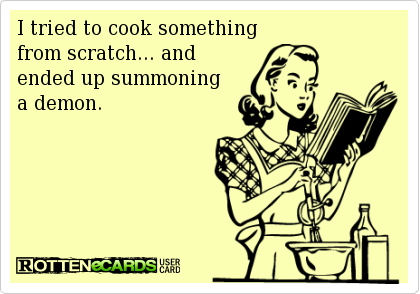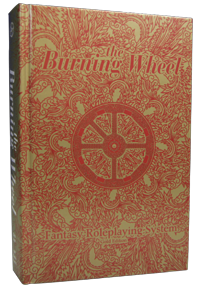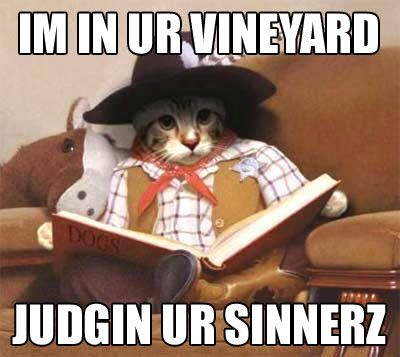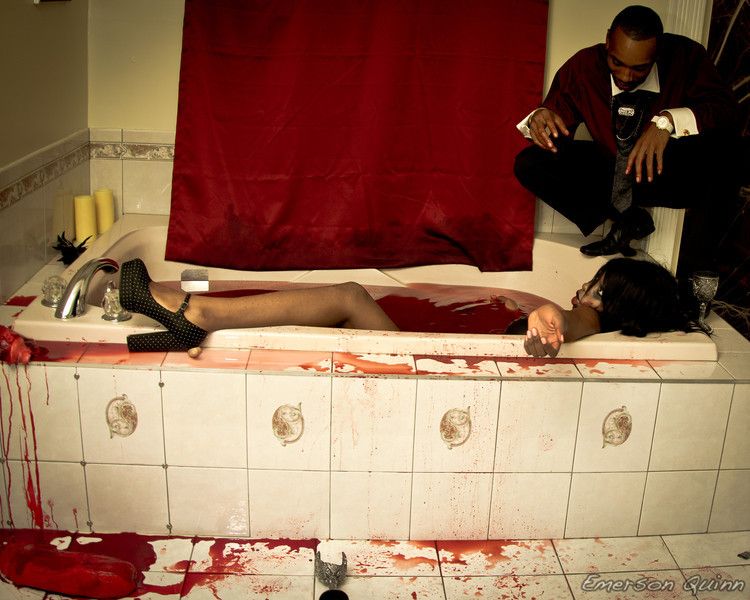That was when I hit the internet, specifically Amazon, and started an out of control wish list, and, even worse, just started buying indiscriminately. Books were showing up on my doorstep weekly, and people at work were asking just how many of "those weird game books" did I actually have. Now, I do have to retract the "indiscriminately" comment. I was picking the best in genre according to forums and prioritizing based on what cool stuff they offered. Still, I was just buying stuff in quantities that I would not be able to play any time soon, and that my group would be dubious or unimpressed by.
The first two books to arrive where Burning Wheel: Gold and Savage Worlds Deluxe Edition. Both completely blew my mind. Savage Worlds was GURPS with five seconds of character creation, playing cards for initiative, and more minis emphasis than I was comfortable with. It was cool, but I instantly knew that my group would not dig it. It lacked the crunch that they enjoy, and all of them expressed dislike the initiative mechanic. Burning Wheel, on the other hand, was an arcane tome of beautifully sentimentalized roleplaying theory and a character creation process that I am still hesitant to attempt lest I dot one "i" too many and end up accidentally summoning a demon.
This is what character creation in Burning Wheel feels like.
Despite its eldritch (and possibly squamous) character creation process, Burning Wheel is something that I would love to play at some point. It was cool, different, but there was no clue I was picking it up and running it for a bunch of people who would like to play Pathfinder and were humoring me, because they like me and want to see what I'm so interested in. It's on the shelf tabbed for re-reading so that I can familiarize myself with it implicitly before loosing it on my friends.
Plus it looks freaking sweet.
I bought the new edition of Traveler, hoping that the original sci-fi RPG would be the new awesome. I haven't determined if I even want to try to finish reading the book. There's a charm to randomly generating your characters, but I am a control freak who wants to play what I fucking want to play, dammit, and if something would bug me if I was a player, I am loathe to do that same thing to players when I GM. I will say, I prefer it over D20 Future, but that's because I don't like the treatment D20 gives sci fi games, and I really don't like the D20 Modern/Future class systems (I've played it a lot, but dear God it bugs me every time). GURPS might still win out for sci-fi. It wins out a lot for me.
Unsatisfied, I started looking into more esoteric games. There were a few people playing Fiasco out at a local gaming store, and one of my group members and I have had a blast playing with them. I started looking into story games. The year I started college, I was without a stable group, and turned heavily to online roleplaying. I'd messed around with some Vampire: the Masquerade stuff online in high school so I was passingly familiar with play by post and found a play by post forum where people played obscure rpg stuff like Amber. What had drawn me was a play by post Firefly freeform game (which I joined and met several roleplayers that I kept in touch with to this day), but I was quickly roped into games of The Mountain Witch and Dogs in the Vineyard.
At that point, both games were new, I had no clue they were anything but random stuff people had made up and put on that site (for the life of me, I wish I could remember the site's name. I'd like to go back). I had a lot of fun, especially with The Mountain Witch, and set out to find both. The Mountain Witch proved impossible to find not in PDF, and I hate PDFs. If I pay money for something, I want an actual book. I did, however, find Dogs in the Vineyard. It was freaking expensive for a tiny digest sized less than two hundred page pamphlet. I added it to my wishlist on Amazon and moved on. I started reading about DIY D&D on Playing D&D With Pornstars, and decided to just DIY a game up and go for it.
Last week I found a used copy of Dogs in the Vineyard for $5. I bought it. I got it yesterday, and quickly realized that somehow I'd completely missed the fact that the game was about Mormons with fabulous coats and six shooters. It was also far more awesome than I'd remembered. I just finished reading it today, and, if I hadn't already put together so much stuff for a D&D game, I'd just force my group to play Dogs with me and that would be final. But Mormons?!
Mormons?!
The book doesn't actually say it's about Mormons until the chapter at the end where in a list of suggested reading material it lists the Church of Latter Day Saints website, but, as someone who has a few Mormon friends, knows a bit about theology and religious stuff, and has watched every South Park episode, I immediately picked up on it. That being said, the book handles a real world religious subject manner in a way that is both respectful and makes it cool. Of course, I like playing characters with religion (or at least faith in something greater), so it clicked quickly with me. The fabulous coats part didn't hurt.
For those of you who don't know what Dogs in the Vineyard is, it is about a Mormon wild west where the church sends out ordained young men and women as "Dogs" to deliver the mail and root out sin and corruption in the towns and flock. The Dogs have complete authority to humiliate, punish, and even kill to deal with wayward folk. They get to do exorcisms, perform marriages, and basically fuck shit up. It's really freaking cool. You're the Spanish Inquisition just in the wild west. And you're a Mormon. I had no problem being sold, but I have a sinking feeling that the whole Mormon thing will be a hard pitch for people I want to play with.
Here's the premise in a nutshell except for more demon possessions and illicit sex.
The other thing that I noticed about this book (that I had noticed with Burning Wheel as well) was the idea that there was a "wrong" way to play the game. Both get a little preachy about being played as a collaborative experience. Dogs in the Vineyard actually has several sections that suggest the GM should run setting details by the players down to minutiae like if the town should have a mill or not (okay, it doesn't give this specific example or any example, but it's stuff like this). Evidently, if my players aren't down with the idea that the tavern serves barley beer instead of oat and I declare barley beer is on tap, we are having badwrongfun.
Now, I get what they're pushing. I like a collaborative game experience, but I'm the damn GM. If I decide the final conflict is on a bridge just outside of town, then it's on the damn bridge. The book counters this with "what if it was reconciled earlier?" Then it was fucking resolved earlier. Neat. But I'm a competent enough GM to stage stuff to my liking while making it natural. The how to play stuff seems good for people who have never played a RPG before, but it's a bit insulting to a good GM. Kinda like the disclaimers in the front of White Wolf books that say that vampires aren't real, and you shouldn't kill people because of this product...
I dunno, officer, we were playing Vampire: the Masquerade and shit just got too real.
Still, Dogs in the Vineyard is one game that is at the top of my gaming list. I can ignore preachy paragraphs, take the setting, the awesome bidding system it uses for dice rolling that feels very poker-ey (and thus very western-ey), and my group of players and have an awesome time. After I run D&D. My roommate has informed me he very badly wants to play a Ranger or Barbarian or Samurai or something. I am nothing if not a roleplaying enabler. Anyways, the moral of the story is that setting out on the search for a new RPG can involve murder, Mormons, and summoning demons from the pits of Hell. At least I didn't die in character creation when I was trying to make a character for Traveler. Because evidently that can happen. And if you die in the RPG, a piece of you dies in the real world.





No comments:
Post a Comment